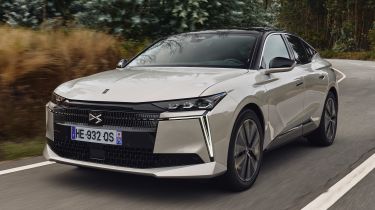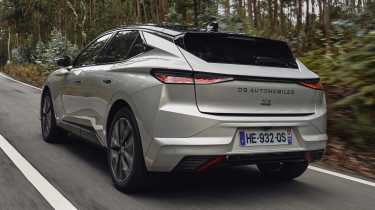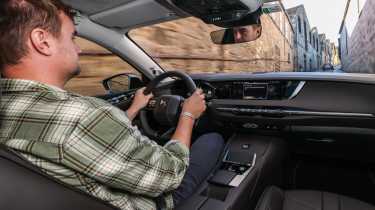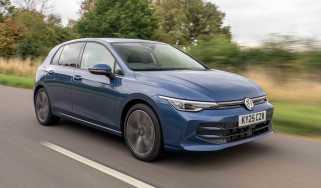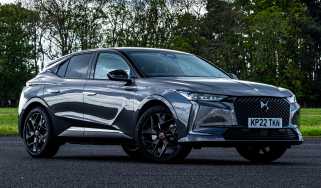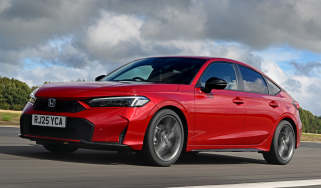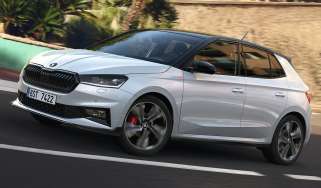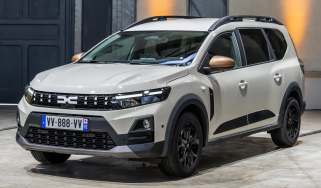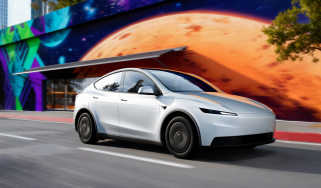New DS No.4 2025 review: forget sporty, this hatch is pure comfort
The new DS No.4 is as comfortable as they come, but falls to stand out against a host of talented hatchback rivals

Verdict
The No.4 keeps the DS 4’s brief as a refreshing alternative in the premium family hatchback market - one that does away with sportiness in favour of comfort and interesting design. With electric power, the No.4 is better than ever, but it’s got a load of excellent rivals, so you’ll really have to fall in love with its looks and ride quality to choose it.
There’s not quite a full-blown revolution going on at DS, but the French brand is changing things up this year. It’s going from simply numbering its models to a new ‘No’ naming strategy and the latest to receive this is the No.4, an updated version of what was formerly known as the DS 4.
That’s nowhere near the most important aspect of the new No.4, however, because for the first time, DS’s family hatch is being offered with pure-electric power, in this E-Tense form.
DS says that gives the No.4 leverage against rival premium hatches, such as the Audi A3, BMW 1 Series and Mercedes A-Class, because none of them offer an EV option. What it also does is open up the DS No.4 E-Tense to a load of new rivals – from high-spec versions of the Volkswagen ID.3 and Cupra Born to the entry-level Tesla Model 3.
Used - available now

2025 Hyundai
Ioniq 6
15,984 milesAutomaticElectric
Cash £27,197
2023 Volkswagen
Tiguan
40,391 milesAutomaticPetrol1.5L
Cash £21,697
2020 Audi
Q5
59,383 milesAutomaticPetrol2.0L
Cash £20,697
2024 BMW
1 Series
31,627 milesAutomaticPetrol1.5L
Cash £18,997The No.4’s new exterior design clearly aims to mimic the flagship No.8, which sits on parent firm Stellantis’ STLA Medium architecture, although the DS No.4 uses the same EMP2 platform as the DS 4. That means the DS No.4 E-Tense’s set-up is a known entity, having already been put to use in the newly facelifted Peugeot E-308.
The figures for the DS No.4 E-Tense aren’t Earth-shattering, but they are at least competitive. Whether you go for the entry-level Pallas trim or the Etoile version we tested, the range stands at 280 miles. We’ve reached a point now where any family-sized EV with a range under 300 miles comes under a bit of scrutiny; during our test drive around Porto and the surrounding countryside, the DS returned efficiency of 3.8 miles per kWh, giving us an expected range of just 221 miles.
That wouldn’t be too much of an issue if the DS No.4’s charging speed was class-leading. But with a maximum rate of 100kW equating to a zero to 80 per cent top-up in 31 minutes, it’s not.
Despite this, having also tried the No.4 with the new Hybrid 145 powertrain and as a plug-in hybrid (which now gets a bigger battery), we came away thinking the pure-EV is the one to have.
DS is squarely targeting the premium sector (as was evident during the brand’s frequent comparisons to Mercedes and BMW during the car’s presentation), so having a silent powertrain with oodles of torque but without feeling sporty, seems to be the obvious solution for the DS.
Indeed, electric power suits the No.4 to a tee. Around town the front-mounted electric motor is peppy and responsive, while on the motorway we could make overtakes on a whim. Although the silence of the electric powertrain gives way to a little hum for pedestrians at low speed – which is audible in the cabin – refinement is further boosted by acoustic glass all around. This helps dampen road and wind noise, which the No.4 does very effectively.
The No.4 is significantly heavier in all-electric E-Tense form at 1,793kg, compared with the 1,454kg mild hybrid and 1,663kg plug-in hybrid. However, that does the ride no harm, and if anything, the E-Tense has the best ride of the bunch. As you’d expect from DS, the No.4 is set up for comfort and thanks in part to its crossover-esque proportions (the No.4 is taller than any of its German rivals), there’s loads of suspension travel to soak up the nastiest bumps and potholes. Even more impressive is the fact this ride quality comes on 19-inch wheels, which are standard fit.
You might think the slightly raised profile (compared with a regular hatchback) and the weight would mean the No.4 is no good in the bends, but switch it from Eco or Normal to the Sport mode and you’ll be greeted with a surprisingly noticeable change in steering weight. It’s not as if you’ll go seeking out your favourite road in the No.4, but it’s nice to know the steering feel is pretty linear, while there’s a decent amount of grip and not too much body roll.
When we ran a DS 4 as a long-term test car, the interior design was a real highlight and it remains a special place to be in the No.4. The air vents in the doors (which are a wonderfully nineties bit of design) help give the dash an expansive look and there’s very little piano black plastic on display. In fact, the majority of the materials used in the No.4 are excellent, whether you go for the entry Pallas with its soft-touch, dimple-effect dash and intricately stitched seats, or our Etoile variant’s swathes of black Alcantara.
The interior isn’t perfect, though. For the No.4, DS has removed the gesture control panel because not enough customers wanted it; it’s replaced by a panel that has no function whatsoever. This means you rely more on the newly added 10-inch central touchscreen and the voice control system. The basic layout is the same as in Vauxhalls and Peugeots, although DS has its own surface-level infotainment design. We found it quite slow to respond to inputs, while the integrated sat-nav in particular was laggy – and at points completely wrong; it once asked us to drive through someone’s garden. Thankfully, Android Auto and Apple CarPlay are standard across the board and a breeze to connect.
In every model, the front of the cabin is a lovely place to be – and you’ll be the envy of rear-seat passengers, because it remains exceptionally tight back there if you’re over six foot. The boot isn’t the most spacious in the class at 390 litres, but if you choose the mild-hybrid version, this goes up to 430 litres; the plug-in hybrid only offers 360 litres.
Did you know you can sell your car through Auto Express? We’ll help you get a great price and find a great deal on a new car, too.
| Model: | DS No.4 E-Tense |
| Price: | £36,995 |
| Powertrain: | 58.3kWh battery + 1x e-motor |
| Power/torque: | 213bhp/345Nm |
| Transmission: | Single-speed automatic, front-wheel drive |
| 0-62mph/top speed: | 7.1 seconds/99mph |
| Range: | 280 miles |
| Max charging: | 100kW (0-80% in 31 minutes) |
| Size (L/W/H): | 4,400/1,830/1,470mm |

